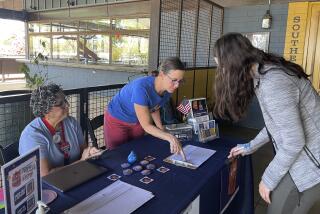Open-Adoption Initiative Is Facing Voters in Oregon
PORTLAND, Ore. — In the most aggressive move yet to lift the veil of secrecy that has shrouded many U.S. adoptions since the 1940s, Oregon voters today will consider a ballot initiative that would open original birth certificates to all adult adoptees.
The initiative would make Oregon one of only three states that does not offer a guarantee of secrecy to birth mothers who request it. And because it is the first time the initiative process has been invoked on an issue that state legislatures have largely refused to tackle, its expected passage is likely to launch a wave of open-records movements across the country.
Proponents say the widening interest in opening records reflects a coming-of-age of baby boom adoptees, born under a surge of secrecy laws enacted after World War II, who are only now coming to terms with the mysteries of their pasts.
“They keep saying that adoption gave us the chance to be raised by a good and loving family. I don’t believe you should have to give up your civil rights to get a good home,” said Denise Catellucci, the producer of an online information site for adoptees who is working for passage of the measure.
But opponents say the measure would violate pledges of confidentiality to thousands of women who gave up babies born under what was once a stigma of illegitimacy. Many of those women have gone on to marry and bear other children, they say, and their lives could be shattered by the arrival of a child from their past.
“For us, it’s very similar to what lies at the heart of all professional relationships,” said William Pierce, president of the National Council for Adoption, which is helping to fight the measure. “Everybody understands that there is doctor-patient confidentiality, there is lawyer-client confidentiality. For decades, women have understood that if you decide to place your child for adoption, the records are sealed, that chapter of your life is sealed, you go on with your life. Now, retroactively, the rules of the game are being changed.”
Adoptions across the country were largely open until a postwar wave of out-of-wedlock births led to a move toward confidentiality. Every state except Kansas passed laws sealing original birth records, including Oregon, whose statute was passed in 1957.
Since then, only Alaska and Tennessee have moved to reverse the trend, although Tennessee’s open-record statute has been challenged in court and has yet to go into effect. Kansas maintains its open-record law, and neither Kansas nor Alaska has seen a demonstrable statistical impact. Abortion rates, for example, have been unaffected, while a slightly higher rate of adoptions in Kansas than those in surrounding states could reflect the fact that other laws on the books there make adoptions easier.
Initiative Is Aimed at Legislative Logjam
For years, adoptee-rights organizations have attempted to persuade other states to open birth records but have been stymied by aggressive lobbying from adoption agencies, intermediaries and lawyers who cite decades of confidentiality pledges to mothers.
Bastard Nation, one of the most activist of the adoptee-rights groups, saw Oregon and its history of progressive ballot initiatives--including the nation’s only physician-assisted suicide law--as prime territory to begin breaching the legislative logjam.
If the measure is successful--and both sides say it is likely to pass--Bastard Nation leaders vow to launch initiative attempts elsewhere. “Once we see a million Oregon voters, we’re ready to take it to Nevada, Montana, Arizona, maybe New Mexico and Washington state, California eventually,” spokesman Ron Morgan said.
Moreover, proponents of the measure say success in opening adoption records is likely to escalate the debate to include the growing number of children produced by in vitro fertilization and anonymous sperm and egg donation.
The Oregon measure reflects a trend toward open adoptions, which in recent years have become the standard rather than the exception.
Now birth mothers are likely to receive scrapbooks with photographs and pictures reflecting their child’s life with an adoptive family, said Lauren Greenbaum of the Portland-based adoption agency Boys and Girls Aid Society.
On the other side, birth parents seeking to give up a child are asked to supply every conceivable kind of information their child might someday wish to know: Were the parents early walkers and talkers? What is their family medical history? Do they consider themselves trusting, or shy? What were their favorite subjects in school?
Adoptee’s Search Has a Happy Ending
Helen Hill, an elementary school art teacher and sculptor who is the organizer of the ballot initiative, was 10 years old before she had any inkling she was adopted. High on a shelf, she remembers, she found a book about adoption and confronted her mother.
It wasn’t until she was 41, however, that she actively began looking for her birth parents. The only record about her mother was cryptic. “[Blank space] is a healthy, attractive girl who wears her hair in a long bob.”
Finally, through an Internet search group, she was able to track down her mother, now 83 and living in Iowa, without official state assistance. Two years ago, she made the first phone call.
“I told her where and when I was born, and she started crying. There was a long silence, and then her first words were, ‘I love you,’ ” Hill recalled. Her mother told her she had fallen in love with a dashing Italian lieutenant but couldn’t keep the baby she conceived.
Soon, her birth father heard the news and called Hill. “Your mama was the love of my life!” he declared.
“I was never at peace until I looked into my mother’s eyes,” Hill said. “But what I realized a few hours after meeting her was, I wasn’t looking for her; I was looking for me. And I found it.”
Opponents of the measure say that for every Iowa housewife praying her daughter will someday call, there are others who dread any encounter with their past.
A Portland woman named Mary who gave up the daughter she conceived after she was raped 28 years ago is one of a number of rape victims who have been among the most vocal opponents of the measure.
Mary had seen the man who raped her go on to abuse other women in his life. Eventually, she said, he got an 18-year-old girl pregnant, then murdered her and their child after the baby was born, before killing himself.
While the man was still alive, Mary feared that the daughter she never knew would learn her father’s identity and track him down, and perhaps be in danger herself. After he died, she feared the girl would learn about his crimes through newspaper accounts while researching her identity.
Eventually, Mary located her daughter and found a way to tell her about the nature of her conception. But a measure like the one now on the ballot would not allow her the luxury of control, she said.
“When I was raped, I was left having no voice and no choice, and no rights. Again, I am re-victimized with this measure,” she said.
More to Read
Sign up for Essential California
The most important California stories and recommendations in your inbox every morning.
You may occasionally receive promotional content from the Los Angeles Times.










